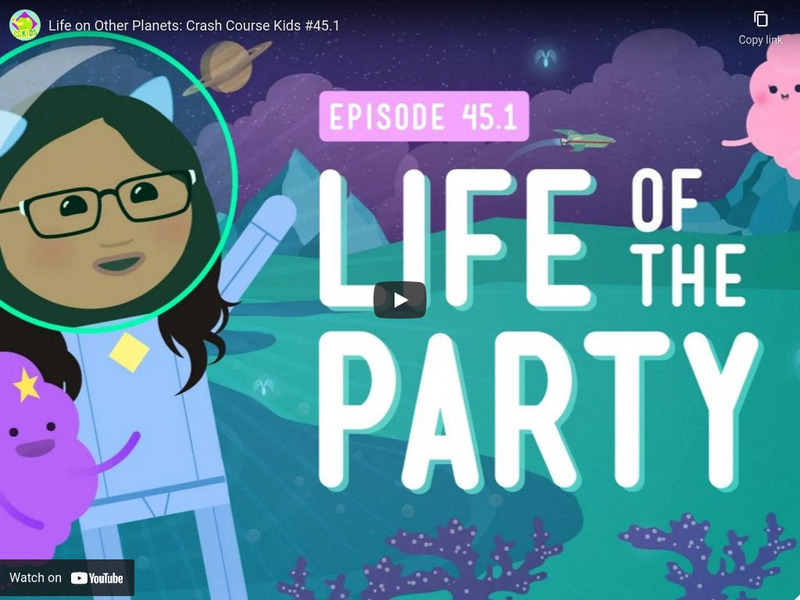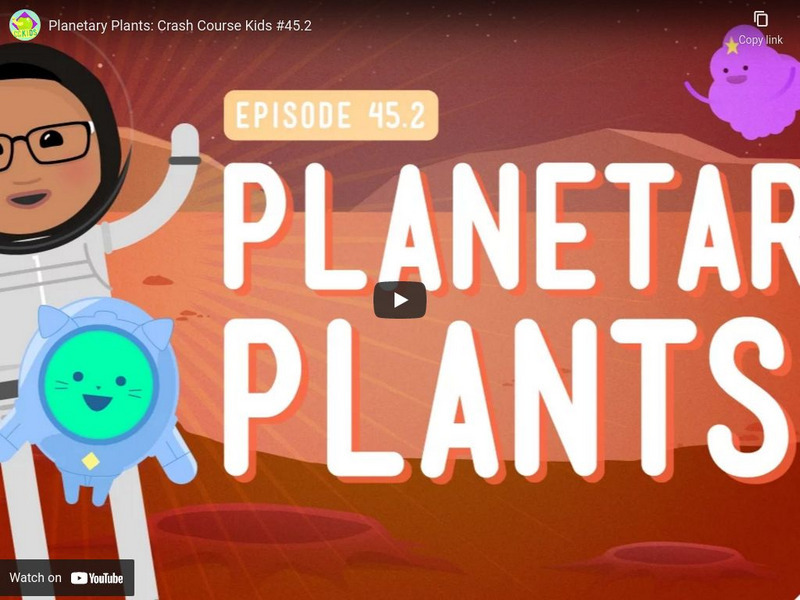msvgo
Energy Flow in Ecosystem
It explains the unidirectional flow of energy through different trophic levels; energy flow maintained by laws of thermodynamics, food web, food chain and the ten percent law.
Wonderscape
Science Kids: Matter and Energy in Organisms and Ecosystems
This video explores the concepts of matter and energy in organisms and ecosystems. It explains how food provides energy for organisms, how plants use photosynthesis to convert sunlight into glucose, and how consumers obtain energy by...
Rock 'N Learn
Life Science: Ecosystems
Here's an exciting way to learn important facts and get ready for a life science test! In this episode we'll be looking at ecosystems.
Rock 'N Learn
Life Science for Kids - Photosynthesis, Cells, Food Chains & More
Here's an exciting way to learn important facts and get ready for a life science test! Marko the Pencil and his friend Bailey take learners on a fascinating journey to Marko's Super Science Station where it's easy and fun to grasp...
FuseSchool
Food Chain
In this video, we are going to look at a food chain and the different roles within that. So we will discover exactly what each of these words mean: food web, food chain, trophic level, producer, consumer, herbivore, carnivore, omnivore,...
Visual Learning Systems
Ecosystems Review
This video summarizes the topics covered in the Ecosystems series. This video explores the features of ecosystems, including abiotic and biotic components and their interactions with the physical environment. The speaker also discusses...
Visual Learning Systems
Food Chains and Food Webs in Ecosystems
This video explains how ecologists use diagrams to illustrate the feeding relationships between organisms in an ecosystem. It introduces the concept of a food chain and highlights the complexity of natural ecosystems by introducing the...
Visual Learning Systems
Food Chains: Food Webs
It is fascinating to explore the energy relationships between living things. This exciting video investigates the process of living things producing energy, consuming it, and breaking it down. Food chains and food webs visually...
Visual Learning Systems
Energy in Ecosystems
This video explains the concept of energy flow in an ecosystem, particularly in a forest ecosystem. It highlights the relationship between producers, consumers, and decomposers and how they interact with each other to obtain energy....
Visual Learning Systems
Energy in Ecosystems
The video discusses the concept of energy flow in an ecosystem, highlighting the complex relationships between producers, consumers, and decomposers. A simplified diagram of a forest ecosystem is shown, illustrating the...
Visual Learning Systems
Ecosystems Quiz
This is a quiz on the topics covered in the Ecosystems series. Viewers are asked to fill in the correct word to complete a sentence related to the topic. The sentences cover concepts such as the study of living things in the environment,...
Visual Learning Systems
Introduction to Ecosystems
The video explores the different environments on Earth. The video also introduces the concept of an organism's environment, which includes all living and nonliving things it interacts with. Ecosystems part 1/8
Curated Video
B.C. group wants to kill seals and sea lions to save the whales
A B.C. group says the quickest way to reverse declining salmon numbers is to kill tens of thousands of seals and sea lions, reducing their numbers by 50 per cent.
Getty Images
ECU R/F SLO MO Shot of three rotifer keratella with eggs / Newcastle Emlyn, Ceredigion, United Kingdom
ECU R/F SLO MO Shot of three rotifer keratella with eggs / Newcastle Emlyn, Ceredigion, United Kingdom
Getty Images
ECU SLO MO Shot of female rotifer keratella with eggs / Newcastle Emlyn, Ceredigion, United Kingdom
ECU SLO MO Shot of female rotifer keratella with eggs / Newcastle Emlyn, Ceredigion, United Kingdom
Getty Images
ECU SLO MO Shot of Rotifers Synchaeta pectinata / Newcastle Emlyn, Ceredigion, United Kingdom
ECU SLO MO Shot of Rotifers Synchaeta pectinata / Newcastle Emlyn, Ceredigion, United Kingdom
Sky News
MPs Call For Total Ban On Use Of Microbeads In Cosmetic Products
MPs Call For Total Ban On Use Of Microbeads In Cosmetic Products
Bill Nye
Bill Nye The Science Guy on the Food Web
Plants. We can't live without them! Bill Nye discusses how every living thing relies on plants using a concept called the food web. In a very visual demonstration, he ties a cord from one picture to another on a three-dimensional...
PBS
Pbs Learning Media: Wolves of Yellowstone National Park
Discover why the gray wolves were important to Yellowstone National Park before they become extinct in that area. Find out how gray wolves were reintroduced back into this area. [5:19]
PBS
Pbs Learning Media: Vulture: India's Clean Up Crew
In this video, students examine the role of vultures as scavengers, and explore the link between the vultures' niche and human health in India. [4:40]
Crash Course
Crash Course Kids 45.1: Life on Other Planets
In this episode of Crash Course Kids, Sabrina shares some ideas about what life might be like on other planets. [4:27]
Crash Course
Crash Course Kids 45.2: Planetary Plants
In this episode of Crash Course Kids, Sabrina talks about what plant life could look like on other planets. [4:39]
Other
Chesapeake Bay Program: Ecosystem
Learn how the Bay, its habitats, and the plants and animals they support form a productive and complex ecosystem.
PBS
Pbs Learning Media: Oil Contamination Affects Food Web
This video adapted from KTOO explores the impact of oil contamination on the herring population of Prince William Sound, Alaska, in 1999, 10 years after the Exxon Valdez oil spill.3m 03s





